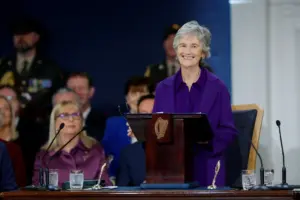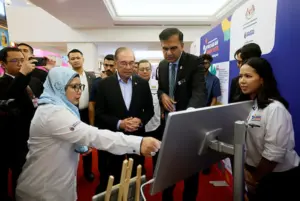PETALING JAYA: Malaysians are set to pay less at the pump as RON95 petrol will fall to RM1.99 per litre by the end of this month under the government’s targeted subsidy scheme, a move economists say will ease household expenses, increase purchasing power and support domestic spending.
Home Minister Datuk Seri Saifuddin Nasution announced the price cut in a post on his Facebook page yesterday.
“Although it took some time, Alhamdulillah, the prime minister has kept his word. Insya-Allah, every promise made will be implemented for the benefit of Malaysians.”
Saifuddin Nasution reminded Malaysians to ensure that their MyKad is functioning properly as the subsidy would only be applied when the card is used for identity verification at petrol stations.
Citizens with damaged or unreadable chips can have them replaced on the same day at any National Registration Department office or counter nationwide.
“The Madani government remains committed to assisting the people, safeguarding the welfare of all groups and promoting economic growth with integrity and responsibility.”
Economists welcomed the move, noting its benefits for households and the broader economy.
“From the people’s perspective, those receiving the subsidy will feel happy. Previously, when RON95 was RM2.50, they could buy less fuel with the same amount of money. Now at RM1.99, they can buy more, effectively increasing their purchasing power,” said Universiti Putra Malaysia associate professor Dr Ida Md Yasin.
She said not all Malaysians would benefit equally as the subsidy depends on MyKad verification.
“From the government’s perspective, subsidies mean allocating funds to lower the prices of retail goods. With targeted subsidies, not all Malaysians will receive them. So, there is some cost balancing involved. Whether this is sustainable in the long-term depends on the government’s fiscal space and priorities.”
Universiti Teknologi Mara economist Dr Mohamad Idham Md Razak said cheaper fuel reduces transport costs and prices of basic goods, stimulating domestic spending and easing inflationary pressures.
“Effects must be monitored to avoid long-term price distortions.”
He said targeted subsidies are more sustainable than blanket measures but require long-term fiscal reforms.
Universiti Kebangsaan Malaysia economist Assoc Prof Dr Noor Azuan Hashim said the move is beneficial despite short-term drawbacks.
“The targeted RON95 subsidy may have negative effects for one or two years but in the long-term, it allows the government to channel funds to other sectors such as education and healthcare.”






